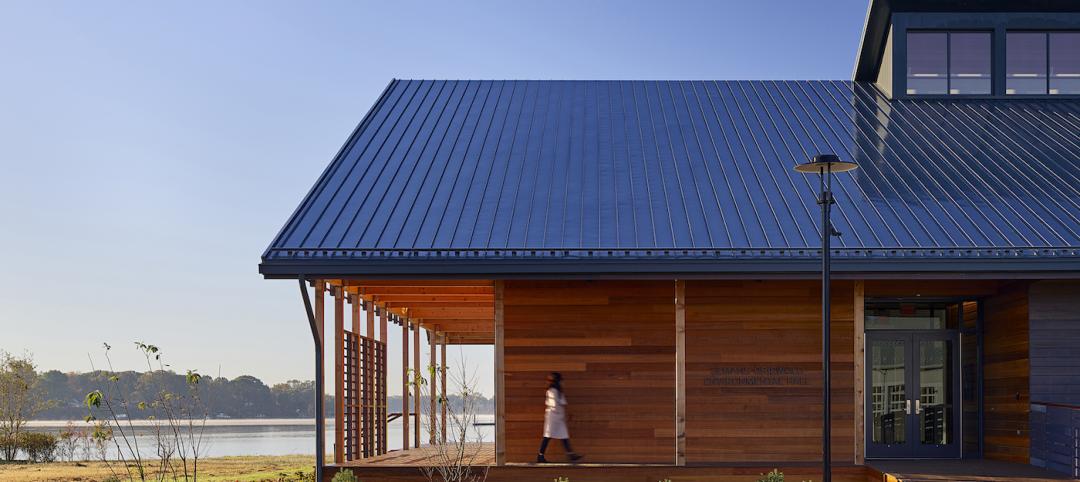The jury for the American Institute of Architects (AIA) Upjohn Research Initiative, a joint program of the College of Fellows and the Board Knowledge Committee to support knowledge sharing between practitioners and academicians, has announced the four projects selected to receive grants. The purpose of this grant, now in its ninth year, is to provide base funds for applied research projects that advance professional knowledge and practice. The 18-month long project grant qualifies recipients to have their findings and outcomes published both electronically and in a nationally distributed publication. The total award of $100,000 will be spread across the selected proposals. The four selected projects are listed below.
Auto-Shading Windows: Smart Thermobimetal Solar Blinds
Principal Investigator: Doris Sung, AIA (DOSU Studio Architecture)
With pressure from the outdoor environment such as swells in temperature, humidity, precipitation and demands from the interior to achieve variable comfort standards and evolving uses, buildings need to adjust automatically. By incorporating new, smart materials and creative assemblies, buildings now have the potential to modulate changes throughout the day. Smart materials require no added energy or computer controls. Thermobimetal is a smart material that automatically curls when heated and, when utilized strategically, can help liminal building surfaces automatically and optimally respond to temperature changes and direct sunlight. This proposal seeks funding to build a window prototype that will automatically block up to 90 percent of the sunlight entering a building while retaining a high level of visibility and view throughout the day. The net effect of this zero-energy system is energy and cost savings.
Building Resilience: A Tool for Planning & Decision-making
Principal Investigator: David Fannon, AIA (Northeastern University)
Recent events show the urgency of designing resilient new buildings and upgrading existing ones. However, it is not clear which combinations of attributes make buildings more likely to maintain useful function and adapt in the face of disturbances. Furthermore, buildings can be assessed based on the impacts from and contributions they make to the robustness, redundancy, resourcefulness and rapidity to recover of surrounding urban ecological systems. These are critical questions for architects, communities, and businesses, and yet there is very little information to guide decision-making about resilient building attributes. To meet this need, this project will develop a web-based tool to evaluate and compare multiple dimensions of resilience and sustainability in buildings, including technical and socio-ecological performance, energy use, and lifecycle impacts.
Clothesline Sunpower: PV Papeles
Principal Investigator: Kristina Yu, AIA (University of New Mexico; McCLAIN + YU Architecture & Design)
This proposal aims to demonstrate the design opportunities of the mobile installation of a new system of photovoltaics also known as solar panels. This investigation will examine the energy capture difference between the separate but related test project of the microelectronic photovoltaic (MEPV) taut mechanical shade system vs. this proposal’s novel design for a mobile simple install of a Clothesline Sunpower: PV Papeles MEPV system. The Clothesline Sunpower: PV Papeles MEPV system aims to capture sufficient to abundant energy to supply a home without the cumbersome and panelized PV panels which require extensive installation and space requirements. The MEPV technology affords a higher level of energy capture while providing a new tactility and versatile flexibility uncommon to PV systems today. The researchers aim to simplify the component pieces of the current MEPV taut shade and to create a functional temporary MEPV system that has the duality of ‘ease of install’ and ‘ease of use.’ Much like placing clothes on a line to dry in limited vertical spaces, the panels, with visual and high efficient variety, can be placed outside to collect the sunpower to harness and store within the interior space.
Point-of-Decision Design (PODD) to Support Healthy Behaviors in the College Campuses
Principal Investigators: Upali Nanda, Assoc. AIA, and Michelle Eichinger (Center for Advanced Design Research and Evaluation – CADRE/HKS; Designing4Health)
This research study aims to address the causes of weight gain, also known as obesogenic, in students on college campuses by answering the question: how can we make the healthy choice an easy choice through the design of critical point of decision prompts? The hypothesis is that well-designed point of decision prompts can promote healthier choices by students that can have a ripple effect on mental and physical health related to obesity. At each point of decision, design can help/hinder the healthier choice. There is a need to collate the vast information in planning and public health domains on a range of successful point of decision prompts and translate it into architectural guidelines that help define the edge condition for critical point of decision prompts. The researchers propose to develop a POD (point of decision) Design Guide and Analysis Tool.
Related Stories
Giants 400 | Aug 28, 2020
2020 Giants 400 Report: Ranking the nation's largest architecture, engineering, and construction firms
The 2020 Giants 400 Report features more than 130 rankings across 25 building sectors and specialty categories.
Architects | Aug 27, 2020
Strategically planning your firm past the COVID-19 pandemic
As AEC firm leaders consider worst-case scenarios and explore possible solutions to surmount them, they learn to become nimble, quick, and ready to pivot as circumstances demand.
Digital Twin | Aug 27, 2020
The Weekly show: Digital twin technology and social equity in the AEC market
The August 27 episode of BD+C's "The Weekly" is available for viewing on demand.
Architects | Aug 26, 2020
We the People: Four steps for the architecture profession to build unity through design
Architect offers a 4-point manifesto to the design community to work for racial and social justice in the U.S. following the death of George Floyd.
Coronavirus | Aug 25, 2020
Video: 5 building sectors to watch amid COVID-19
RCLCO's Brad Hunter reveals the winners and non-winners of the U.S. real estate market during the coronavirus pandemic.
Architects | Aug 19, 2020
Japan’s Tokyo Toilet project looks to improve the perception of public restrooms
17 toilets throughout Shibuya will be redesigned as part of the project.
Architects | Aug 5, 2020
Final report: BD+C's 2020 Color Trends Report
This special research report from the editors of BD+C explores the leading trends and drivers related to the use of color on commercial, institutional, and multifamily building projects.
University Buildings | Aug 2, 2020
R&D hubs, modular-built hotels, and an award-winning student center on the August 6 “The Weekly”
R&D hubs, modular-built hotels, and an award-winning student center on the August 6 “The Weekly”
University Buildings | Jul 24, 2020
A hybrid learning approach could redefine higher education
Universities reassess current assets to determine growth strategies.
Coronavirus | Jun 19, 2020
Experts address COVID-19's impact on nursing homes and schools on The Weekly
The June 18 episode of BD+C's "The Weekly" is available for viewing on demand.

















